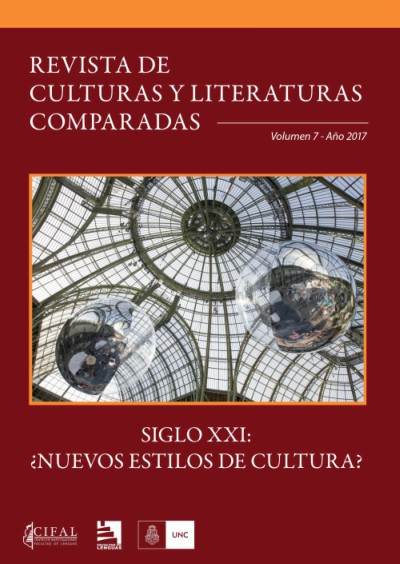The Heterosis of the Anglophone Neo-Victorian Novel in the New Millennium
Keywords:
neo-Victorian, biocrusade, metafictional, immersiveAbstract
This work inscribes itself as part of a more encompassing research project about the neo-Victorian which purports to inquire into the functions of the categories of subversion and nostalgia in a corpus of millennial Anglophone neo-Victorian novels. This presentation approaches one representative text – The Dark Clue (2001) by James Wilson – which displays a particular oxymoronic fusion: nostalgic returns to certain narrative strategies of Victorian writing and the use of metafictional strategies which, however, abstain from both pyrotechnic self-reflexive experimentation and short-circuiting of immersive reading experiences. The work postulates a new double coding whereby the category of novel analyzed represents a search for neomorphic possibilities in the face of the exhaustion of the metafictional features most closely associated with a postmodernist poetics, and therefore, part of a style of culture – known as postmodernism – but without failing to subscribe to a thematic agenda that responds to a postmodern style of thought – or postmodernity, according to Terry Eagleton’s distinction.
Downloads
References
Boym, Svetlana. The Future of Nostalgia. Nueva York: Basic Books, 2001.
Brindle, Kym. Epistolary Encounters in Neo-Victorian Fiction: Diaries and Letters . Basingstoke y Nueva York: Palgrave Macmillan, 2014.
Gutleben, Christian. “Hybridity as Oxymoron: An Iinterpretation of the Dual Nature of Neo-Victorian Fiction”. Hybridity. Forms and Figures in Literature and the Visual Arts. Ed. Vanessa Guignery, Catherine Pesso-Miquel, y François Specq. Newcastle: Cambridge Scholars Publishing, 2011. 50-70.
Heilmann, Ann y Llewellyn, Mark. Neo-Victorianism. The Victorians in the Twenty-First Century, 1999-2009 . Londres y Nueva York: Palgrave Macmillan, 2010.
Hobby, Nathan. “Immortalities and Biographical Quest in the Twenty-first Century: The Origins and Future of a Genre Reconsidered”. Tesis de Maestría. M.A. The University of Western Australia, 2013. Web. 1 junio 2016.
Hutcheon, Linda. A Poetics of Postmodernism: History, Theory, Fiction. Nueva York: Routledge, 1988.
Kohlke, Marie-Luise. “Mining the neo-Victorian vein. Prospecting for Gold, Buried Treasure and Uncertain Metal”. Neo-Victorian Literature and Culture: Immersions and Revisitations . Ed. Nadine Boehm-Schnitker y Susanne Gruss. Londres y Nueva York: Routledge, 2014. 21-37.
McHale, Brian. Postmodernist Fiction. Londres y NuevaYork: Routledge, 1987.
Pickering, Michael, y Keightley, Emily. "The Modalities of Nostalgia". Current Sociology 54.6 (2006): 919-941. Web. 23 junio 2015.
Spanos, William V. Repetitions. The Postmodern Occasion in Literature and Culture. Baton Rouge y Londres: Louisiana State University Press, 1987.
Stonehill, Brian. The Self-Conscious Novel: Artifice in Fiction from Joyce to Pynchon . Philadelphia: University of Pennsylvania Press, 1988.
Taylor, Mark C. Tears. Nueva York: State University of New York Press, 1990.
Thiem, Jon. “Intertextual Lives: The Novel of Biographical Quest as a Postmodern Genre”. Sincronie III.5 (1999): 137-150. Web. 19 marzo 2016.
Waugh, Patricia. Metafiction. The Theory and Practice of Self-conscious Fiction. Londres y Nueva York: Routledge, 1985.
Wilson, James. “Background”. James Wilson. Web. 20 marzo 2016.
---. The Dark Clue. Nueva York: Grove Press, 2001.
Downloads
Published
Issue
Section
License
Aquellos/as autores/as que tengan publicaciones con esta revista, aceptan los términos siguientes:
a) Los/as autores/as conservarán sus derechos de autor y garantizarán a la revista el derecho de primera publicación de su obra, el cual estará simultáneamente sujeto a la Licencia de reconocimiento de Creative Commons.
b) La cesión de derechos no exclusivos implica que la publicación de los artículos en la presente revista no quita la posibilidad o el derecho al autor/a de publicar su obra de manera posterior en otras revistas u órganos editoriales y la autorización por parte de los/as autores/as para que el trabajo sea depositado en los repositorios institucionales, tales como el Portal de Revistas de la Universidad Nacional de Córdoba.



